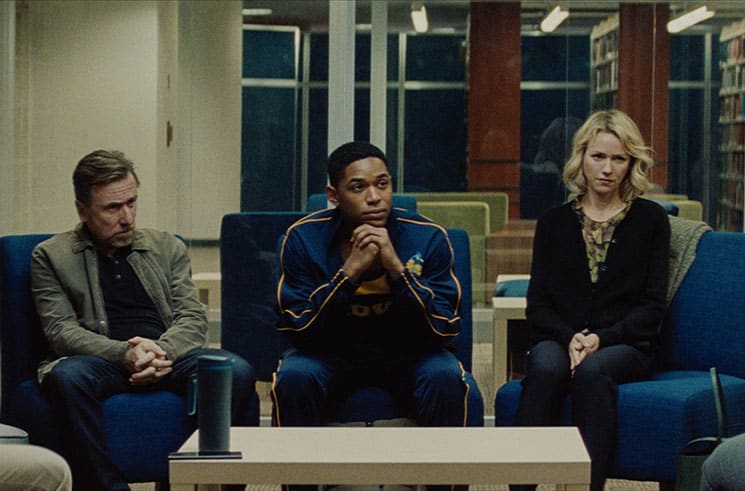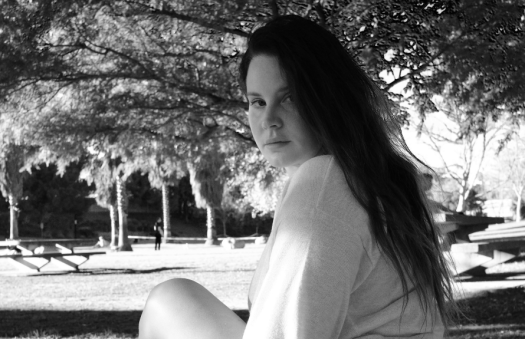If Green Book's Oscar win taught us anything, it's that Hollywood loves inspiring dramas about racial reconciliation. Luce, however, is not that. It's a tense, frustratingly ambiguous thriller about the struggles of a black teenager trying to conform with society's impossibly high expectations. Easy answers and satisfying resolutions are in short supply.
Luce Edgar (Kelvin Harrison Jr.) is a high school senior and model student; he aces his classes and is a star on the track team, and everyone agrees he's destined for greatness. His accomplishments are particularly impressive, given his troubled past: he was a child soldier in a war-torn African country before being adopted at age 7 by his well-off white parents Amy (Naomi Watts) and Peter (Tim Roth).
Luce raises some red flags when he writes a class paper about a violent revolutionary, and his prying teacher Harriet Wilson (Octavia Spencer) discovers some illegal fireworks in his locker. Everyone suddenly begins questioning the golden boy: is Luce actually hiding dark secrets? Or is Ms. Wilson simply trying to tear down the star student?
Geoff Barrow (of Portishead) and Ben Salisbury composed the score, and their dark synth-scapes do a lot of the heavy lifting in terms of tone. With different music, Luce might have presented as just another emotional family drama — but the ominous drones and atmospheric hip-hop flourishes hint at a menace bubbling just beneath the surface.
For a while, it's not quite clear where the film is going. There's a lot of talk about childhood trauma, allegations of sexual assault, and peripheral characters who struggle with drugs and mental illness. Amy flip-flops between defending her son and interrogating him, and she violates his privacy in some surprising ways. There aren't so much twists as shifts between different grey areas.
It's all a bit muddled, but the Luce finally flips into focus with some cutting commentary on American race relations. By addressing some of the more subtle, pernicious forms of racism, it doesn't let audiences off the hook with simple solutions, and it might make so-called progressives a little uncomfortable about their own latent biases.
Luce won't make anyone feel warm and fuzzy about race relations. That's what makes it gripping — and it's also why you probably won't see it at next year's Oscars.
(Elevation Pictures)Luce Edgar (Kelvin Harrison Jr.) is a high school senior and model student; he aces his classes and is a star on the track team, and everyone agrees he's destined for greatness. His accomplishments are particularly impressive, given his troubled past: he was a child soldier in a war-torn African country before being adopted at age 7 by his well-off white parents Amy (Naomi Watts) and Peter (Tim Roth).
Luce raises some red flags when he writes a class paper about a violent revolutionary, and his prying teacher Harriet Wilson (Octavia Spencer) discovers some illegal fireworks in his locker. Everyone suddenly begins questioning the golden boy: is Luce actually hiding dark secrets? Or is Ms. Wilson simply trying to tear down the star student?
Geoff Barrow (of Portishead) and Ben Salisbury composed the score, and their dark synth-scapes do a lot of the heavy lifting in terms of tone. With different music, Luce might have presented as just another emotional family drama — but the ominous drones and atmospheric hip-hop flourishes hint at a menace bubbling just beneath the surface.
For a while, it's not quite clear where the film is going. There's a lot of talk about childhood trauma, allegations of sexual assault, and peripheral characters who struggle with drugs and mental illness. Amy flip-flops between defending her son and interrogating him, and she violates his privacy in some surprising ways. There aren't so much twists as shifts between different grey areas.
It's all a bit muddled, but the Luce finally flips into focus with some cutting commentary on American race relations. By addressing some of the more subtle, pernicious forms of racism, it doesn't let audiences off the hook with simple solutions, and it might make so-called progressives a little uncomfortable about their own latent biases.
Luce won't make anyone feel warm and fuzzy about race relations. That's what makes it gripping — and it's also why you probably won't see it at next year's Oscars.




